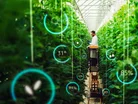Blockchain: The Secret Sauce for a Secure Food Supply Chain

The global food system is worth US$9tn and yet 9% of the world’s population is undernourished. From the food swamps of Britain to the flooded fields of Pakistan, the current food system is insufficient. Yet the industry is estimated to contribute up to 34% of global greenhouse gas emissions.
The World Economic Forum (WEF) has been searching for ways to put a more sustainable food system on the menu. Enter blockchain technology, which offers unprecedented transparency, traceability and security to food supply chains.
Blockchain's role in transforming the food industry
Firstly, what is blockchain?
Blockchain is a decentralised way of recording information digitally, like a database. The data is transparent and immutable - once information is added, it's difficult to change it.
So how can blockchain help?
Modern food supply chains are plagued with inefficiencies, security issues and a lack of transparency. These problems cause food waste and even fatalities linked to contamination. Blockchain technology could address these issues, by offering a secure and transparent system. In utilising blockchain, the food industry can enhance its ability to provide safe, accessible and more sustainably produced food.
Walmart, number #1 on Forbes’ Fortune Global 500, already uses blockchain to track food products, from field to freezer.
This level of transparency ensures that environmental, social and governance standards are met, while also making sure that producers are paid fairly.
CO2 emissions and supply chain visibility issues can be addressed with blockchain
Blockchain's transparency is most important when dealing with Scope 3 emissions, which come from a company's supply and value chains.
These emissions are difficult to manage, especially when suppliers work in regions with poor environmental regulations. Blockchain offers a clear record of each transaction within the supply chain, enabling companies to monitor and lower their carbon footprint across multiple tiers of suppliers.
Visibility is another pain point in traditional supply chains, where companies often struggle to look beyond their immediate suppliers.
This lack of visibility weakens supply chain resilience, but with blockchain’s distributed ledger system, supply chain participants can access the same data, ensuring better communication, trust and coordination.
Blockchain is a recipe for security and sustainability in the global food supply chain
Blockchain also offers greater security benefits in the age of cyber-attacks. Blockchain’s decentralised structure distributes data across multiple nodes, reducing the risk of such attacks and protecting sensitive supply chain information.
"We’re seeing blockchain technology improve operations and the end-user experience across many industries — and its potential to transform supply chain management is enormous," shared Matthew Van Niekerk, CEO of blockchain platform SettleMint.
He added that blockchain not only ensures more accurate tracking but also promotes security in data exchanges, making supply chains more efficient, resilient and compliant.
In addition to its security advantages, blockchain is a driving force in encouraging sustainable innovation across the food supply chain.
From soil management improvements to emission reductions, blockchain supports the adoption of practices and technologies that make food production more efficient for everyone.
As blockchain stands out as a tool for transforming the global food supply chain, the WEF will continue to explore paths to a sustainable future.
******
Make sure you check out the latest industry news and insights at Food Digital.
******
Food Digital is a BizClik brand
Featured Articles
Fresh investment supports TRACT in enhancing tools for sustainability in the food and agricultural sectors, aligning with EU regulations
The devastating floods in Spain have shaken up the global citrus supply, heightening challenges in the fruit juice drinks market
McDonald's has spent 40 years supporting students with scholarships & plans to continue, despite Robert F. Kennedy Jr.’s plan to Make America Healthy Again



